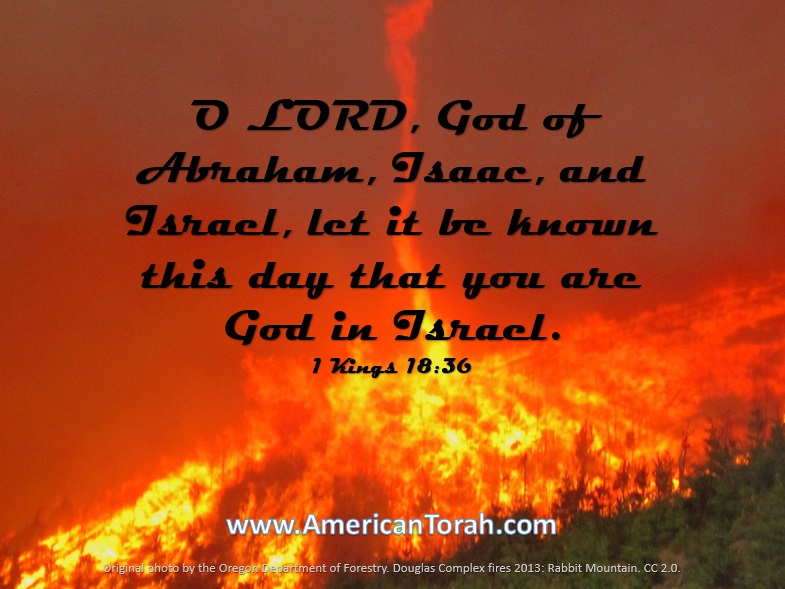
God wants obedience. He said that if we love him, we will keep his commandments. Yet, Moses and Elijah both appear to have disobeyed God and were honored for it.
Although God had said that the only place authorized for making sacrifices was at the place where he would “put his name” (Deuteronomy 12:11), Elijah built an altar at the other end of the country. After he put the sacrifice on it and soaked it with water, he asked God to light it for him, and God did, sending fire from heaven to consume it, stones, water, and all. (1 Kings 18:18-40)
Moses came down from Sinai after forty days to find the people worshiping and sacrificing to the golden calf, and God said, “Step aside, Moses. I’m going to destroy these people and start over with you.” Moses refused and appealed to God’s reputation (His name) to convince him not to destroy Israel. “What will the Egyptians think of you?” God honored Moses’ disobedience and spared the nation. (Exodus 32:7-14)
The truth is that neither Moses nor Elijah were actually disobedient. If you have been keeping Torah for long, then you have probably realized that there are times when you must stretch or appear to violate one law in order to keep another. For example, it’s good to work on the Sabbath in order to free a trapped animal or to heal an injured man or feed the hungry. Not only is it not a sin to rescue someone on the Sabbath, but it would be a sin *not* to! Sometimes it takes a great deal of wisdom to weigh the competing priorities. The same thing is going on in both of these stories. There are important elements in both passages that aren’t made explicit in the text but that make all the difference in understanding what was going on.
When Elijah offered a sacrifice on Mount Carmel instead of at the Temple, in Jerusalem, he appeared to be in violation of this commandment. But he didn’t actually make the sacrifice. He only went half-way. He killed the animal and laid it out on the altar, but then he waited for God to finish the job. He stretched the letter of the Law, but he didn’t break it.
On the other hand, there can be no compromise with Baal or his prophets. We are commanded not to tolerate them, especially not in the Promised Land. Israel was supposed to have driven out all of the Canaanites and destroyed all of their shrines so that they would not be tempted to take up their false religion (Exodus 34:10-17). But Israel neither drove them out nor destoyed their holy places, with the end result that the northern Kingdom of Israel was thoroughly infested with idolatry from the very beginning.
Elijah picked a fight with the priests of Baal in the heart of the land they thought of as their own, but which actually belonged to God. He rebuilt one of the abandoned altars of God’s and proved who was the real owner. He understood God’s character well enough to know which rule took precedence in that situation and how far the one could be bent in order to preserve the whole.
When Moses stood in God’s way on Mount Sinai, he understood that God’s destructive power couldn’t really be constrained by a mere man. So why would God say such a thing? By telling him to move when clearly no movement was necessary, God was subtlely teling Moses that he had the authority to intercede on Israel’s behalf. For God to make promises of salvation to Israel and then to destroy them would itself be a violation of Torah, so Moses knew that it wasn’t really what God wanted to do. It was a test of Moses’ faith in God’s promises and of his willingness to sacrifice himself on behalf of the people, and Moses passed both tests.
God gave Moses authority over and responsibility for the people of Israel. He was their judge, teacher, and protector. He was the man whom God used to free them from captivity. When they fought the Amalekites, Moses’ upraised arms enabled their victory. When they complained against God, his intercession saved them from destruction. Moses, by divine appointment and as a type of the Messiah, was a spiritual covering for Israel. When God threatened to destroy them, Moses was duty-bound to intervene even against God himself. His role as Israel’s leader took precedence over any possible role as the progenitor of a new people, and he honored God by putting his own life on the line to save his disobedient, ungrateful people.* “God,” he said, “if you will destroy these people, then destroy me too, because otherwise I will have failed them, you, and myself.” Like Elijah, he had a heart that understood God’s.
I pray that YHWH will bless me with such understanding, with such love, with such a relationship with him, that I will know how to obey him even when obedience seems impossible, how to honor his calling, his people, and his Torah. Baruch HaShem!
*What a great example for all leaders and husbands! Moses put his own life in jeopardy because his love for God and his people demanded it.
Everything that Yeshua (aka Jesus) & the Apostles taught
Come with me as I draw out the connections that are so often missed |


Great word, Jay. This is a good reminder not to judge another believer’s act of “obedience” just because it’s not the way you might have handeled the situation. Our choices to obey or disobey, and our understanding of obedience-v- disobedience are often grounded in the quality and sincerity of our relationship with God.